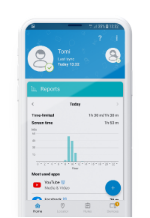ANIMALIA – Influencers
Do influencers always have good influence on children? Find out in the new episode of "Animalia", educational, interactive, animated series about child safety on the internet.
Nowadays, most of us are familiar with the pop-up that appears when we open a new app, asking us if we want to allow that app to access our location. This is, essentially, geolocation: data about a person’s location that is transmitted by a device, or activity on that device.
While most people allow geolocation services without a second thought (sometimes doing so allows for a far more convenient, accurate, and personalized experience), there are some significant drawbacks, especially when it comes to kids.
First of all, we encounter many, many smartphone users—of all ages—who are simply unaware that their smartphones and certain apps are transmitting location information. What’s more, many people aren’t aware that what they share on social media might be visible to the broader, anonymous public (depending on their settings and device configuration).
For kids, this can be dangerous. Just as you wouldn’t want to broadcast to the world that your home will be vacant for the next week while you go to Disney World, you wouldn’t want your kids sharing their exact location with the whole world on social media. Without the right privacy settings in place, there’s no guarantee that this information won’t fall into the hands of cyberbullies, stalkers, or even cybercrooks.
There are a few things parents can do to make sure their kids are safe when using social media. Above all, talk to your kids about the risks of oversharing. While your kids might already know about the idea of digital privacy and bad actors, have the chat anyway to find out how much they know. You might even learn a thing or two yourself.
To avoid inappropriate location sharing, teach your children to keep the GPS function on their mobile phone or tablet turned off, both on the device itself and within each app.
Yet, even with GPS turned off there are ways a child can unwittingly disclose their location. A photo from a recognizable location or even a description of the location can also be problematic. And do your kids know, for example, that geolocation data is also embedded in the images and videos they share—data that you might not “see,” but that more technically savvy actors certainly can?
Finally, it’s important to audit the privacy settings for each social media platform that your children use. Inevitably, you’ll find an app set to share profile information and posts publicly, as opposed to only friends and family. Limiting that visibility can help prevent strangers or bad actors from determining a child’s location.


With ESET Parental Control for Android
Try free for 30 daysDo influencers always have good influence on children? Find out in the new episode of "Animalia", educational, interactive, animated series about child safety on the internet.
Posting mean comments on social media is not cool. Does your child know that? Enjoy "Animalia", educational, interactive, animated series about child safety on the internet.
Monique, Elias' classmate, is targeted by an anonymous online hater. What can Elias and Linda do to help her?